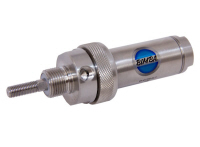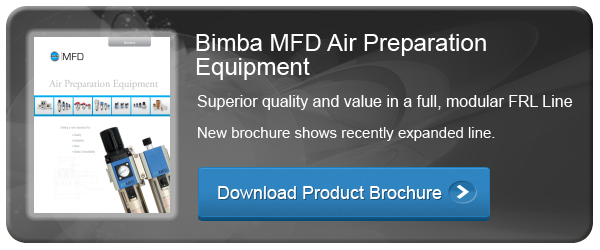This post is brought to you by Bimba Technical Tips.
 When specifying cylinders, it’s important to consider the operating environment. That’s because temperature, air quality and radiation can have a direct, negative effect on your cylinder’s performance. By taking the time to factor in the operating environment, you’ll be better prepared to select a cylinder with the right type of seals, materials and finishes for long life and optimum performance. Let’s look at a few environmental factors.
When specifying cylinders, it’s important to consider the operating environment. That’s because temperature, air quality and radiation can have a direct, negative effect on your cylinder’s performance. By taking the time to factor in the operating environment, you’ll be better prepared to select a cylinder with the right type of seals, materials and finishes for long life and optimum performance. Let’s look at a few environmental factors.
Temperature affects cylinder’s seals and lubrication
If your application involves temperature extremes -- below -20°F (-25°C) or over 200°F (95°C) -- you can expect shorter cylinder life span. At these temperature extremes, seals become damaged or brittle, metal becomes overstressed, and lubrication turns too thick or too thin. If the cylinders are operating below 0°F (-18°C) or up to 400°F (204°C) for extended periods of time, you can specify special seal modifications. The best way to avoid any temperature-related problems is to specify the temperature of the operating environment if either high or low temperatures are involved.
Radiation and caustic washdowns attack cylinder material
Radiation causes a change in almost all materials and, in some cases, causes materials to disintegrate. It’s important to know the type and intensity of radiation so you can accurately estimate the expected life of your cylinder. Regular cleaning of cylinder exteriors with a caustic washdown can cause corrosion, shortening cylinder life. Special finishes and materials are available to reduce the corrosive effect on the cylinders and special designs can help keep washdown fluid out of the cylinder’s interior.
Poor air quality can accelerate corrosion and shorten seal life
Indoor and outdoor air quality can affect your cylinder. Cylinders exposed to a factory’s toxic gases, dust and ozone may experience shortened seal life through friction or corrosion. Salt can be very corrosive to the piston rod, and the cylinder head and body. Food processing, in particular meat processing, often coats the cylinder with grease, affecting the rod and other cylinder components.
Cylinders operating outdoors are subject to rain, sun, wind, dust and, in some areas, snow and freezing. In addition, certain outdoor applications expose the cylinder to harmful substances. For example, cylinders used on road machinery with moist concrete dust or tarry substances require extra protection. Special finishes and/or materials are typically required for cylinders in farm machinery equipment since dust, fertilizers and animal wastes are extremely corrosive to many metals.




